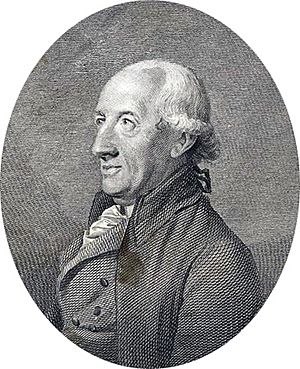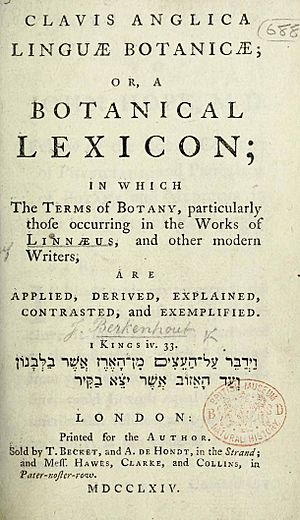John Berkenhout facts for kids
Quick facts for kids
John Berkenhout
|
|
|---|---|
 |
|
| Born | 8 July 1726 |
| Died | 3 April 1791 (aged 64) |
John Berkenhout (born July 8, 1726 – died April 3, 1791) was an English physician, naturalist, and writer. He studied medicine at universities in Edinburgh and Leyden. While he was a student, he wrote a book about plants called Clavis Anglicae Linguae Botanicae. He also wrote several books about nature, like Outlines of the Natural History of Great Britain and Ireland (1769). Later, he worked as a secret agent for Britain during the American Revolution.
Contents
John Berkenhout's Life Story
John Berkenhout was born around 1730 in Leeds, England. His father, John Berkenhout Snr, was a Dutch merchant who had moved to Yorkshire. John went to Leeds Grammar School. His father wanted him to work in business. So, he sent John to Germany to learn different languages.
After living in Germany for some years, John traveled through Europe with some English noblemen. When he returned to Berlin, he stayed with a relative of his father, Baron de Bielfeld.
From Soldier to Doctor
Berkenhout joined the Prussian army as a cadet. He was promoted to ensign and then became a captain. In 1756, when the Seven Years' War began, he left the Prussian army. He then joined an English army regiment.
In 1760, he decided to study medicine. He enrolled at Edinburgh University. From there, he went to the University of Leyden in the Netherlands. He earned his medical degree on May 13, 1765. After finishing his studies, he came back to England. He settled in Isleworth in Middlesex. He also worked as a doctor for a while in Bury St Edmunds.
Secret Mission in America
In 1778, the British government sent Berkenhout to America. He was part of the Carlisle Peace Commission. This group was trying to make peace during the American Revolution. The American leaders would not let the Commission go past New York. But Berkenhout managed to reach Philadelphia.
He knew Arthur Lee, an important American figure. Through Lee, he met Richard Henry Lee. In September, people started to suspect that Berkenhout was trying to influence American leaders. He was arrested and questioned. He was even put in prison for a short time. Later, he was released and went back to the British commissioners in New York. The peace talks did not work out. Berkenhout returned to England and received a pension for his secret work.
John Berkenhout passed away on April 3, 1791, in Besselsleigh, near Oxford.
Berkenhout's Books and Writings
While he was a student in Edinburgh, Berkenhout published a book about plant names in 1762. It was called Clavis Anglica Linguæ Botanicæ Linnæi. This book helped people understand the scientific names of plants. He updated it in 1764 and again in 1766. For his medical degree, he wrote about a disease called gout. In 1766, he published a book about medicines called Pharmacopoeia Medici.
Nature Books and the Brown Rat
In 1769, the first part of Berkenhout's book Outlines of the Natural History of Great Britain came out. The other parts followed in 1770 and 1771. He published a new version in 1773. A revised edition came out in 1788, called A Synopsis of the Natural History of Great Britain.
In these books, Berkenhout was the first to name the brown rat as the "Norway Rat" (Rattus norvegicus). Many people mistakenly think Carl Linnaeus named it, but it was Berkenhout.
Other Important Works
Berkenhout's biggest project was Biographia Literaria. This book was a history of English, Scottish, and Irish writers. It covered authors from early times up to his own day. He only finished the first volume, which came out in 1777.
In 1780, Berkenhout wrote Lucubrations on Ways and Means. This book suggested new ways for the government to collect taxes. Some of his ideas were later used by important politicians like Lord North and William Pitt the Younger.
He also wrote about medical topics. His book Essay on the Bite of a Mad Dog was published in 1783. In 1784, he wrote Symptomatology, which was about understanding symptoms of diseases.
Berkenhout's last book was Letters on Education to his Son at the University, published in 1790. In this book, he shared his thoughts on how children should be educated. He also talked about the system of older students making younger students do tasks, known as fagging, in public schools.
He also translated books from other languages. For example, he translated a French book about nervous diseases. He also edited a new version of John Campbell's Lives of the Admirals.
List of Publications
- Outlines of the Natural History of Great Britain and Ireland (1769)
- Synopsis of the Natural History of Great Britain and Ireland (1789)
- First lines of the theory and practice of philosophical chemistry. London: Cadell, 1788
- A volume of letters from Dr. Berkenhout to his son at the university. London: Cadell 1790
 | Leon Lynch |
 | Milton P. Webster |
 | Ferdinand Smith |


